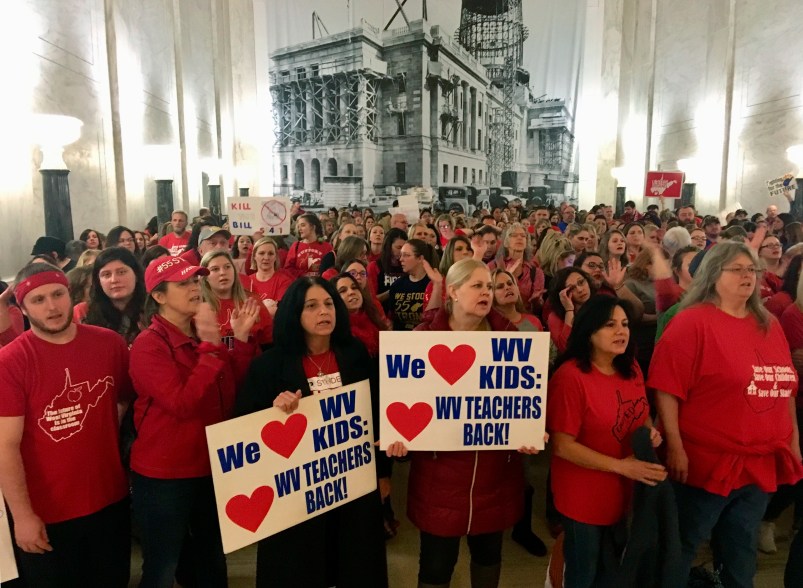CHARLESTON, W.Va. (AP) — Nearly a year to the day after West Virginia teachers went on a strike that launched a national “Red4Ed” movement, they’re doing it again.
Teachers and school support workers lined streets outside schools with picket signs and packed the state Capitol for the first day of a walkout Tuesday over complicated education legislation that they view as lacking their input and as retaliation for last year’s strike.
How long this one goes on will be a day-to-day decision, leaders of three unions for teachers and school service workers said at a news conference Monday.
“We are left with no other choice,” said Fred Albert, president of the American Federation of Teachers’ West Virginia chapter.
The 2018 walkout launched the national movement that included strikes in Kentucky, Oklahoma, Arizona, Washington state, and more recently, Los Angeles and Denver. Teachers in Oakland, California, have authorized a strike starting Thursday.
Now the movement has come full circle.
Nearly all of West Virginia’s 55 counties called off public school classes Tuesday. The only county where classrooms were open was in Putnam County, where school parking lots were nearly empty anyway. A few cars trickled in to drop students off but no buses were seen.
Teachers from neighboring counties joined Putnam County teachers on the picket line as motorists honked their support.
Teachers’ unions oppose complex legislation under consideration that, among other things, would create the state’s first charter schools and allow education savings accounts for parents to pay for private school.
“Our students are first and are not for sale,” said Poca High School English teacher Meghan Stevens. “We believe in the power of public education.”
The unions have said lawmakers never asked for their insight into what has become a rushed process in the Senate, which narrowly passed an amended bill Monday night. The House of Delegates was set to take up the bill again Tuesday.
West Virginia Education Association President Dale Lee said based on the Senate’s actions, “it appears that they are more interested in listening to the outside interests than they are the educators across West Virginia.”
“We will work as closely as we can to get a resolution, but at this point, there doesn’t seem to be a resolution.”
One sticking point has been a provision to create the state’s first charter schools, which the unions believe would erode traditional public education but bill advocates say would give parents more school choices. Charter school laws have been enacted in 43 other states and Washington, D.C.
The Senate version would allow for up to seven charter schools statewide and provide for up to 1,000 education savings accounts for parents to pay for private school. The accounts would be for special-needs students and those who have been bullied.
The House version does not call for such savings accounts and would limit charter schools to one each in Cabell and Kanawha counties.
Gov. Jim Justice said Tuesday he would veto the bill if it includes the savings accounts and more than two charter schools. He was critical of how the Senate handled the legislation.
“What they’re doing is dead wrong,” Justice said. “It’s lunacy to me.”
Among other things, the Senate removed an earlier clause that would invalidate the entire legislation if any part is struck down.
Senate President Mitch Carmichael said the bill found a middle ground and has “great provisions.” It would give teachers additional 5 percent pay raises on top of 5 percent raises they received after last year’s strike.
Carmichael said the bill’s goal is “getting our education system out of the doldrums.”
“Why would anyone want to stand in the status quo and stay in the past?” he said.







I dunno, but something ought to be done with WV schools, they produce too many wingnuts, trumptards and all-around ignoramuses .
C’mon now, y’all greedy teachers. We need at least 50 percent of y’all’s salaries to fund that thar wall down yonder in Areezona. What’s more important: Socialist ‘doctrination of your li’l uns or pro-tectin’ 'em Mountaineer State school children from them Mexican Muslims?
You tell 'em, Linday.
EDIT: Lindsay.
The state legislature really is a bunch of assh*les, isn’t it?
Also, the usual AP: this legislation is complicated, so we’ll just punt on even telling you what it does.
Shorter AP: We don’t understand the legislation.